Watering ginger plants is a delicate job. The soil should neither be too soggy nor too dry. Though it is a tropical plant that enjoys high humidity and a wet environment, it doesn’t enjoy staying in a wet condition.
Ginger must be watered right after planting. After that, check the soil and water just before the soil gets completely dry. You must keep the soil moist but not soggy, as overwatering can rot your plants. Stop watering some weeks before it is time for harvest and during winter.
In this guide, we shall discuss the watering needs of ginger and how to change the routine according to seasons, temperature, and soil type.
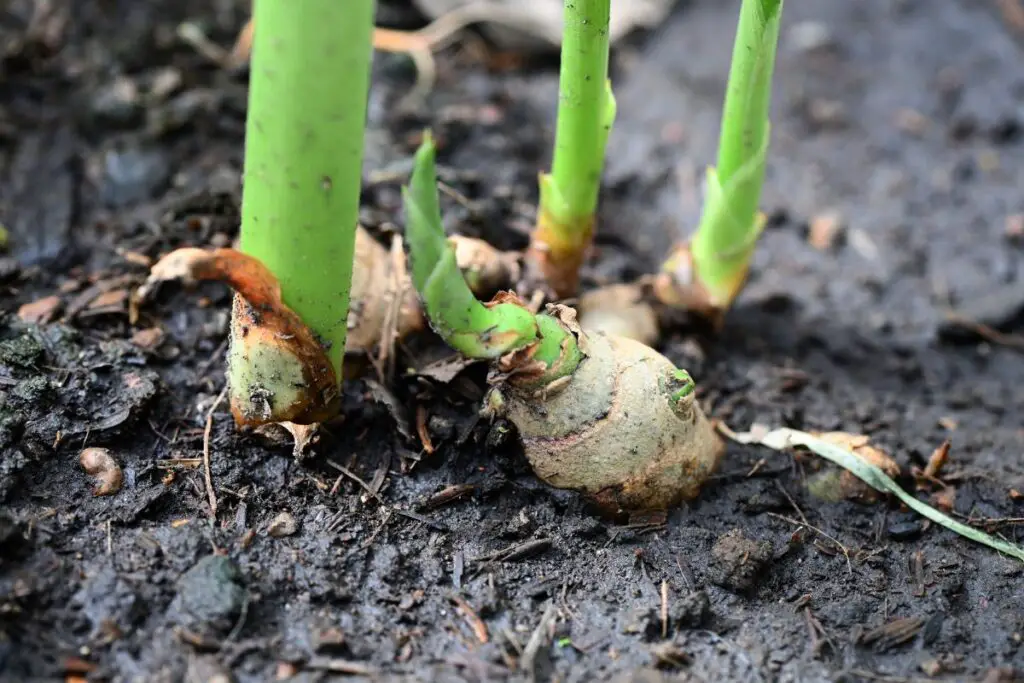
When should I water a ginger plant?
When the soil feels dry, it is the right time to water a ginger plant.
It needs to stay in consistently moist soil and not dry soil.
So, you have to preserve the moisture of the soil.
Ginger is native to rainforest areas where rains are frequent.
You must water them almost daily to mimic and maintain the exact soil moisture like their native land.
At the same time, you must ensure that the soil remains moist and not soggy or waterlogged.
Otherwise, you can increase the chances of root rot.
You can’t let the soil dry out completely.
So, checking the soil’s moisture level with your finger and watering the plant whenever it feels dry is better.
After planting ginger, you should water them thoroughly.
After that, water them deeply throughout the growing season whenever the soil goes dry.
Reduce watering during the late summer or early fall when the leaves and stems start turning yellow.
It is the end of the growing season, and the signs indicate ginger is ready for harvest.
Now let’s understand how different factors affect the watering of ginger plants.
How often should I water the ginger plants?
The frequency of water depends on the time of the year, the temperature, and the soil type they are growing over.
Generally, you can provide ginger with water 1-2 times per week to maintain a proper moisture level.
Seasons
Watering frequency depends highly on the different seasons of the year.
The temperature changes with the seasons.
Sometimes, it is extremely dry, and sometimes it is humid.
Watering increases in hot and dry temperatures and reduces when it gets cold.
So, you must understand the change in watering techniques.
Spring and Summer
In spring, you can water the ginger plants 2-3 times per week, as per the soil’s moisture level.
In summer, the weather remains extremely hot and dry.
So, the ginger plants need to be watered daily, especially if there has been no rain for a long time.
Ginger will require a consistent moisture level throughout the summer.
So, you might have to water them more often than in the other seasons.
You may add some mulch around the garden bed if you live in extremely dry areas.
It prevents the moisture from getting evaporated in the dry summers.
Fall
In the fall, you may reduce watering because it is the rainy season.
The frequent rains will fulfill ginger’s watering needs.
Fall is also the end of the growing season for ginger plants.
So, you have to cut back on watering.
Another reason is the temperature.
The temperature drops a little when fall arrives, and the evaporation rate reduces.
So, you can cut back on watering.
Check the soil and water the plant weekly.
Winter
In the winter, ginger remains dormant, and the evaporation rate is high due to dry weather.
Due to dormancy, you don’t have to water them at that time.
The evaporation rate is not a matter here because ginger is not growing.
In such resting periods, they won’t take up any moisture from the soil.
Watering during the winter will only lead to overwatering and root rot.
Looking for gardening supplies? We have tested 100's of products before recommending them to you guys. Check out our best pick below:
| Image | Gardening Supplies | Best Price? |
|---|---|---|
 Top
Top Top
Top | Raised Garden Bed Kit | Check On Amazon |
 | XLUX Soil Moisture Meter, Plant Water Monitor, Soil Hygrometer Sensor for Gardening, Farming, Indoor and Outdoor Plants, No Batteries Required | No Results |
 Top
Top Top
Top | 82 Pcs Garden Tools Set and Extra Succulent Tools Set | Check On Amazon |
 | Joeys Garden Expandable Garden Hose with 8 Function Hose Nozzle, Lightweight Anti-Kink Flexible Garden Hoses, Extra Strength Fabric with Double Latex Core, (50 FT, Black) | No Results |
 Top
Top Top
Top | Dual Chamber Compost Tumbler | Check On Amazon |
 Top
Top Top
Top | Sunnyglade Plant Stakes | Check On Amazon |
 Top
Top Top
Top | Organic Cold Pressed Neem Seed Oil | Check On Amazon |
 Top
Top Top
Top | Mighty Mint Gallon :-Insect and Pest Control Peppermint Oil | Check On Amazon |
 Top
Top Top
Top | Scotts DiseaseEx Lawn Fungicide | Check On Amazon |
 Top
Top Top
Top | Jacks Classic 20-20-20 All Purpose Fertilizer | Check On Amazon |
 Top
Top Top
Top | 30,000 Seeds Pollinator Attracting Wildflower Mixture | Check On Amazon |
 Top
Top Top
Top | Survival Vegetable Seeds Garden Kit-Over 16,000 Seeds | Check On Amazon |
Soil type
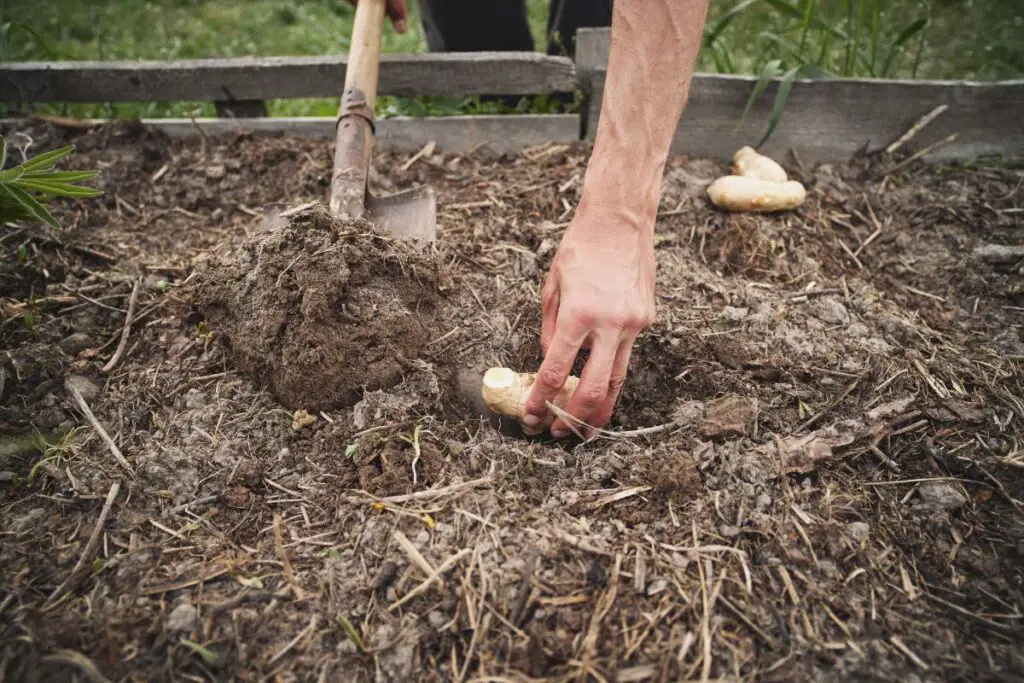
Different types of soil determine the watering schedule.
You should water the ginger plants less often if they grow over clayey soil.
If sandy soil is sandy, you must water ginger plants more frequently.
The watering frequency will be normal if the soil is loose, lightweight, loamy, and well-drained.
All the ginger plants favor this kind of soil.
Planting the ginger plants in loose, light, well-drained, loamy soil is best for them.
It ensures that the soil stays moist and the plant hydrated.
Indoors vs. outdoors
If you are growing ginger plants outdoors, you should water them daily.
You may skip watering for 1-2 days if there has been some rain or the soil is yet to dry.
If you are growing them indoors, you must water them regularly because they won’t receive the rain that outdoor gingers sometimes get.
While growing indoors, ensure the soil surface dries a bit before watering.
The pot must have drainage holes.
The frequency depends on the time of the year, the temperature, and the soil type they are growing over.
If you are not watering the ginger plants daily, check the soil daily to understand the soil’s moisture level.
It will let you know whether the soil is dry or soggy and let you understand when to water them.
Temperature
If you live in hot and dry temperatures, water them every day.
If you live in areas where the weather remains cool and rainy most of the time, add water to the ginger once a week.
You may add mulch around the ginger bed to reduce the evaporation rate.
In that way, you don’t have to water them too often.
Humidity
Ginger plants require 70-90% humidity levels.
Since they love high humidity levels, you must ensure that the plants are always close to the water source and remain moist.
Watering 1-2 times per week is enough if you live in high humid areas.
Ginger plants would then flourish in your garden.
If your region has low humidity levels, you must water the ginger plants daily (except in winter).
If the humidity is standard, you can water them regularly, sometimes giving them 1-2 days intervals.
Whatever the humidity level is, always check the soil before watering.
Can I overwater the ginger plants?
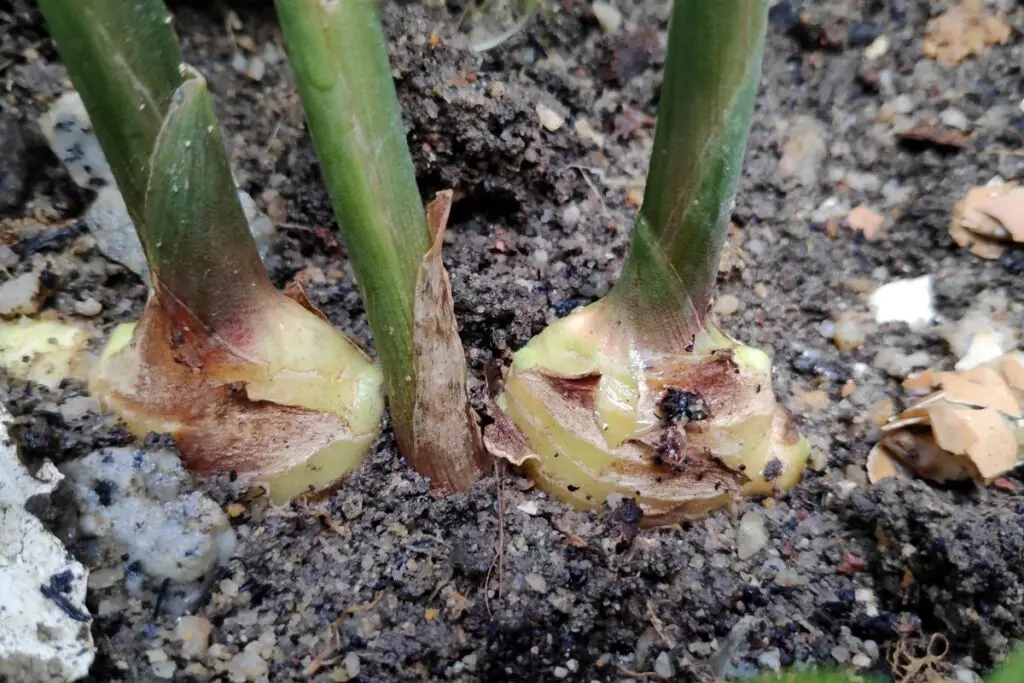
The one thing that you would hate to see is waterlogged ginger plants.
But you need to water the plant deeply whenever required.
You must be careful while watering.
You can overwater the ginger plants in their growing season and hot summers.
If they are healthy and thirsty, they will grow vigorously and absorb the extra moisture of the soil.
That doesn’t mean you can water the plant repeatedly without letting the soil dry.
Besides keeping the soil moist, you should let the top inch dry before watering.
Excessive watering can lead to:
- Rhizome rot due to excessive staying in the water
- Yellow leaves
- Brown leaves because nutrients get washed away
How to prevent overwatering?
While planting ginger, ensure the soil is not very clayey but well-drained, loose, and loamy.
Since ginger mostly grows under partial or full shade, water takes time to evaporate.
Reduce watering in the fall and stop during winter.
Excessive water will cause root rot and kill the plant.
Again start watering when new shoots appear in spring.
If you are growing ginger plants in a pot, check the presence of drainage holes.
Adding a layer of mulch will retain moisture and stop you from overwatering.
So, this will keep you from overwatering and the roots from drowning.
If you overwatered your ginger plant already, immediately cut back watering, and keep checking the soil’s moisture level.
What happens if I underwater the ginger plants?
Dehydration and ginger don’t fit in together.
Ginger plants don’t like to be dry because they are native to rainforest areas where they remain moist and enjoy a wet environment.
If you underwater the ginger plants, you may see:
- Discolored leaves, yellow or brown
- Papery leaves due to excessive dryness
- Dormancy, because without enough moisture, they stop growing.
How to fix underwatered ginger plants?
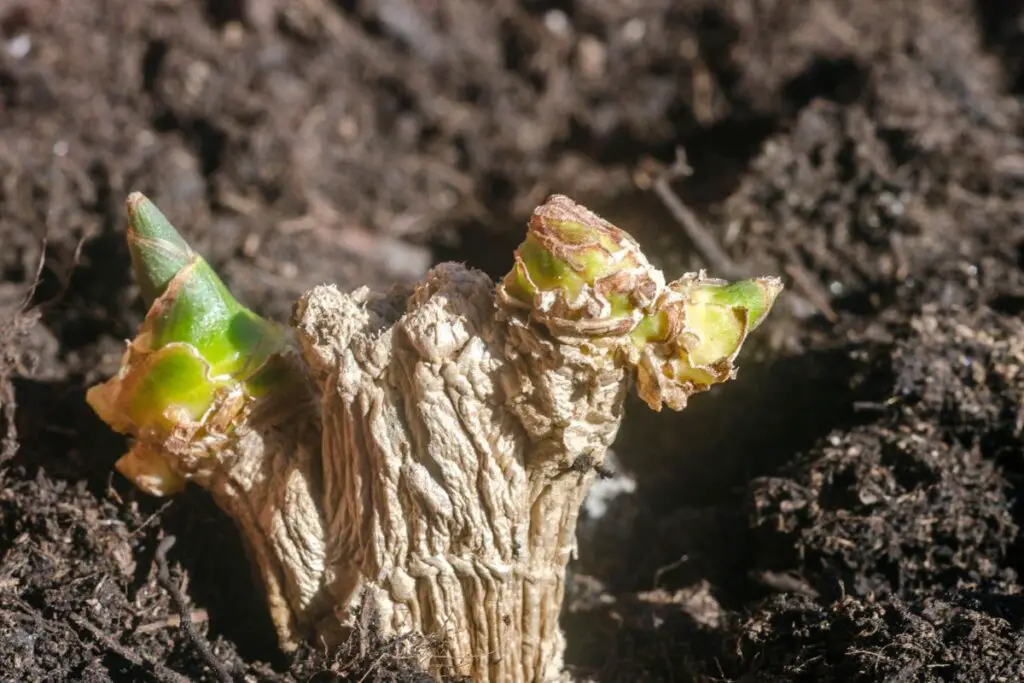
Whenever you find these signs, check the soil and water the plant if it is dry.
To avoid such conditions, always water the plant whenever the soil surface feels dry.
You must water them daily, 1-2 times per week, or as per the plant’s need.
If you are worried you might overwater your ginger plants, add a layer of mulch.
It will retain moisture and won’t let your plant get dehydrated.
Saving an underwatered plant is easier than an overwatered plant.
In underwatering, you can manage it by watering the plant immediately.
But, revival can be difficult in overwatering if the problem has already occurred.
The rhizomes may start rotting due to excessive moisture if overwatering is prolonged.
So, that is a risk.
How much water do ginger plants need?
Ginger requires a lot of water to grow better and faster.
Since it is native to southeastern Asia, which has an annual rainy season in the summer, ginger enjoys a wet environment and consistently moist soil.
If you grow ginger plants outdoors, you can water them either daily or 1-2 times per week if they receive rain.
If they are grown indoors or in pots, you must water them daily because they won’t receive the rain.
Keep pouring water until the excess drains out.
After that, stop watering.
Make sure you have pots with drainage holes because potted plants are more prone to overwatering.
Pots have a limited amount of soil, and thus, they can’t absorb much water.
If water is more than the soil, it will remain stacked in the soil and give rise to rhizome rotting.
In general, whenever and however you water them, ensure that ginger plants get at least one inch of water per week.
How should I water the ginger plants?
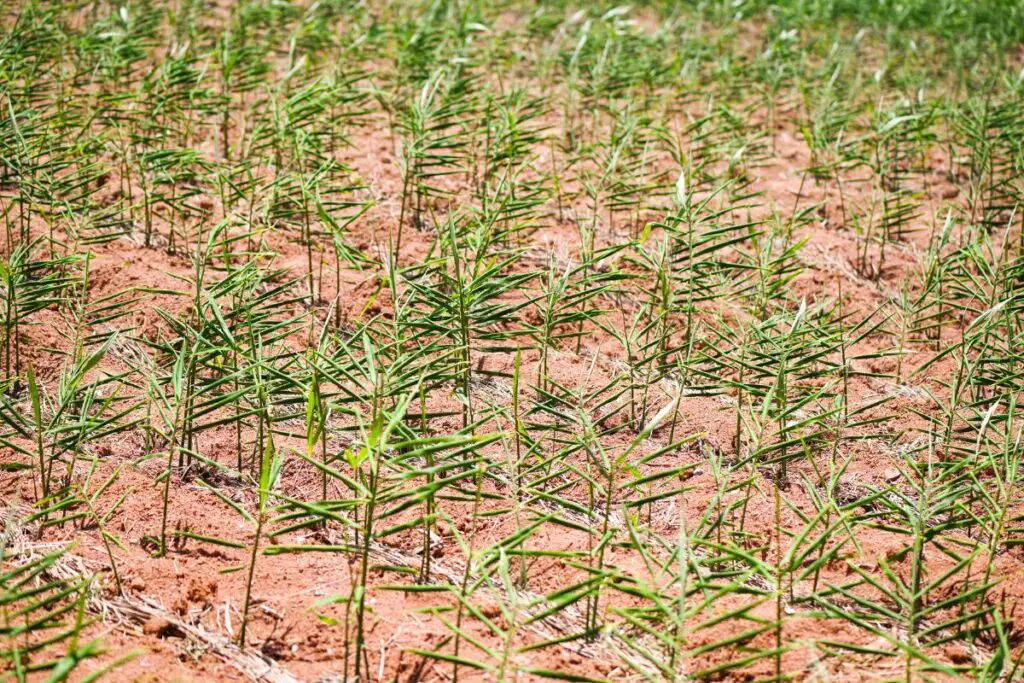
Follow these steps to water your ginger plants correctly:
- Pour the water into the soil thoroughly and deeply.
- If ginger plants are in pots, continue watering until the excess comes out of the drainage holes.
- Since they enjoy high humidity, you may provide water by misting. Misting the leaves every day gives the plant a tropical vibe.
- When fall arrives, cut back watering because it is the season of rains and the end of the growing season.
Final thoughts
Watering ginger is not a very difficult task, but there has to be a balance between dryness and moisture level. You can’t water the plant too much, but you should keep the soil consistently moist.
The watering frequency changes according to the temperature, soil, seasons, etc. The best way to understand the ginger plants’ watering needs you must check the soil with your finger. If the surface or top 1-inch is dry, water the plants.
The best way to avoid overwatering and underwatering is to use well-drained, loose, and loamy soil. Adding some mulch is also better as it retains moisture and stops water accumulation around the roots.
Reference: Ginger Production, Texas AgriLife Extension, USDA, Wikipedia
